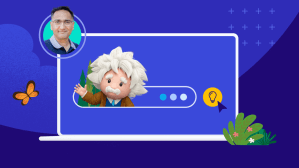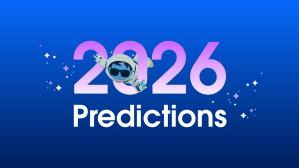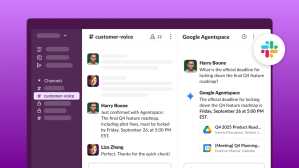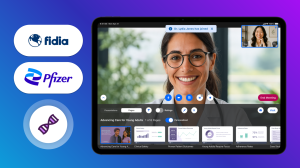Editor’s Note: AI Cloud, Einstein GPT, and other cloud GPT products are now Einstein. For the latest on Salesforce Einstein, go here.
Quick Take
- Einstein GPT will become one of the most ubiquitous generative AI technologies in the enterprise by bringing generative AI directly into the world’s #1 CRM. Einstein GPT delivers AI-created content across every sales, service, marketing, commerce, and IT interaction, at hyperscale.
You’d be hard-pressed to open up a news or business site right now and not find an article on generative AI. It’s a trend that has led many business leaders to wonder: How can I use this emerging technology at my company?
Salesforce’s Senior Vice President of AI and Machine Learning Jayesh Govindarajan has some ideas, each rooted in the deep experience his team brings to the AI space.
“We’ve been innovating with AI for [about] eight years now, and we have implemented the technology at scale,” he said during a recent episode of the Blazing Trails podcast.
Consumer versions of generative AI, like ChatGPT, have dominated the media headlines. But like all new technology, the biggest opportunity to drive adoption at scale is through business. That’s why Salesforce will be one of the most consequential companies in the field of generative AI, with widespread adoption through the world’s #1 CRM delivering AI-created content across every sales, service, marketing, commerce, and IT interaction.
According to Govindarajan, Einstein GPT puts efficiency, optimization, and opportunity at the heart of generative AI in a way that is “uniquely Salesforce.” Here, Govindarajan shares more on what that looks like.
Q. A recent survey of more than 500 senior IT leaders found that a majority believe generative AI is a ‘game changer,’ with 84% saying it will help them better serve their customers. What is Salesforce’s unique approach to generative AI?
There’s been a ton of interest in this domain. Much of what we’ve seen regarding generative AI so far has been consumer facing: ChatGPT, Bing for search, Google’s Bard, and others. But we’re focused on using generative AI to change how business gets done.
Our focus has been on bringing generative AI into Salesforce in a way that can be effective for Salesforce Trailblazers innovating on the platform. The question we’re asking is: How do we bring these technologies into our platform in a safe, secure manner that helps users be more productive? Einstein GPT does exactly that.
The questions companies should be asking are: is What is the business purpose? What specific jobs and tasks can generative AI help with? Funny poems and AI-powered search engines are great, but they’re not going to impact the bottom line and they’re not going to transform your ways of working.
Q. What makes Salesforce ready to deliver the most impactful generative AI capabilities for CRM — and why now?
AI is only as good as the data that powers it, and Salesforce is where thousands of companies across every industry globally manage their sales, service, marketing, commerce, and IT data. That’s an advantage for Salesforce’s customers because they can use their existing data to create and deliver AI-generated content, at scale, conveniently within their existing flow of work.
This is where Salesforce stands apart from the competition. We have the world’s #1 CRM and the world’s most robust customer data set, which allows Einstein GPT to produce AI content in a way that no other enterprise technology company can match.
We have the world’s #1 CRM and the world’s most robust customer data set, which allows Einstein GPT to produce AI content in a way that no other enterprise technology company can match.
Beyond that, we believe there are three things that really work in our favor. One is the nature of generative AI in the workplace — the potential benefits and use cases are endless. And the applications are not open domain or open ended as they are with consumer applications.
The second is our technology. Salesforce can be a powerful multiplier of generative AI experiences because Einstein GPT blends public data with CRM data, and when several million of our customers are all using Einstein GPT, the model gets refined with each instance and becomes more accurate. It’s a cumulative effect and is really a huge differentiator for Salesforce.
The third aspect is, frankly, our expertise in building these systems at scale with trust, with permission from our customers, and with design experiences that keep the human in the loop. For us, this is a next evolution of our work in AI, and is the byproduct of everything we’ve built.
It’s such a team sport, and we have the ability to bring these sort of disparate, cross-functional teams together to define partnerships and policy, build the product, and get the product deployed. We have an exciting journey ahead.
Q. What is Einstein GPT and why does it matter to Salesforce customers?
Einstein GPT is the world’s first generative AI for CRM. By pulling transformative generative AI technology into the Salesforce CRM, customers will have the ability to quickly and easily generate AI-created content across every sales, service, marketing, commerce, and IT interaction.
Einstein GPT pairs Salesforce’s proprietary AI models and trusted data from Salesforce Data Cloud with generative AI technology from an ecosystem of partners — including OpenAI — to deliver experiences that are real time, time-saving, highly personalized, and at hyper-scale.
For example, Einstein GPT can generate personalized emails for salespeople to send to customers, generate specific responses for customer service professionals to more quickly answer customer questions, generate targeted content for marketers to increase campaign response rates, and auto-generate code for developers.
Q. What were the major considerations when you and the team were building Einstein GPT?
Our focus around Einstein GPT has been in three areas. First is the generative aspect of the technology. We’re focused on what it can power. Yes, it can write documents, but we’re also working on its CRM impact beyond automated conversations.
The second aspect is bringing it to customers in a trusted, safe, and secure manner. ChatGPT and other systems are extremely powerful, and built on public data sources, but to work in the enterprise, the technology has to be grounded in the data available in that organization. So, being able to blend public and private data together is what makes this a more trusted, more valuable experience for our customers.
Third, personalization. Using generative AI, and applying that personalization to generative context and content that gets created is going to be extremely powerful, especially within Salesforce and the Customer360.
Q. What’s the best way to explain exactly what Einstein GPT and this type of technology can do in general, but also in the context of Salesforce?
From a user’s perspective, it really reduces the friction of going from an idea to a first draft. That could be writing a document based on six meetings you’ve had. Or, it could be summarizing several conversation streams to look for one or two insights that you can use to improve your approach.
A lot of these are extremely powerful functions that this multitask learning system enables you to go build. If you train it on sales emails, it’ll write great sales emails. If you train it on service emails that are about fixing a modem, it can generate great responses when you ask a question about fixing a modem. These are foundational concepts that we can bring to bear across our clouds.
As an engineer, I’m passionate about Einstein GPT and what it can do for developers: write great quality code in a consistent manner, so every piece of code is not a special and very manual snowflake. I think there’ll be an exponential flywheel effect where the system trains on good quality code and becomes more and more efficient over time.
Q. What makes Salesforce uniquely suited to deliver generative AI capabilities — and why now?
From a Salesforce perspective, there are three things that really work in our favor. One is the nature of generative AI in the workplace — the potential benefits and use cases are endless. And the applications are not open domain or open ended as they are with consumer applications.
The second is our technology. Salesforce can be a powerful multiplier of generative AI experiences because Einstein GPT blends public data with CRM data, and when several million of our customers are all using Einstein GPT, the model gets refined with each instance and becomes more accurate. It’s a cumulative effect and is really a huge differentiator for Salesforce.
The third aspect is, frankly, our expertise in building these systems at scale with trust, with permission from our customers, and with design experiences that keep the human in the loop. For us, this is a next evolution of our work in AI, and is the byproduct of everything we’ve built.
It’s such a team sport, and we have the ability to bring these sort of disparate, cross-functional teams together to define partnerships and policy, build the product, and get the product deployed. We have an exciting journey ahead.
Q. Walk us through an example of what this might hypothetically look like in a work scenario?
Imagine that you want to write an email with meaningful content about how customers can use Trailhead, Salesforce’s free online learning platform, to develop new skills. You want it to be based on data, and in this case you likely want to use Trailhead for the content and messaging.
To have Einstein GPT form output that is meaningful and usable, you want to use the compositional abilities of generative AI but on data that you deem fit — in this case, Trailhead data. This is what we call grounding of large language models. You also want the ability to refine the output based on commands. That layer is the instruction-tuning layer, something that enables the engine to understand your asks based on the prompts you type.
The final layer is what’s called the reinforcement learning with human feedback layer, which is, as you use the system, how do you collect that information on usage? What is a good generative output? What is not a good generative output? What generative output needs to be edited before sending it out to the customer? Human judgment of machine output is a very valuable reinforcing signal.
And again, building this into the Salesforce stack means we can tie that reinforcement to the job to be done in context and use that to enhance the overall generative capability that we produce.
The end game is that we can push those signals into the lower layers of the large language models, to make them more accurate, tuned to the task and ultimately highly efficient.
Q. Who do you think will benefit most from Einstein GPT and this technology right out of the gate?
I see this technology as foundational and benefitting customers across industries, both larger enterprise companies and SMBs. This is a big opportunity for smaller businesses who don’t have a big workforce with lots of resources. There’s a lot of data for these businesses which is truly public data; things that you put on your website, things that you are willing to put out as FAQs. Not everything is private data and low hanging fruit for them will be to build generative experiences for outbound and inbound automation — going from a website visit to a qualified lead, as an example. A lot of these initial experiences will likely be SMB first because they’ll move quickly and be fast to try this.
Large enterprises have an opportunity to accelerate their digital transformation with generative AI as well. By augmenting their workforce with assistive technology such as Einstein GPT for Sales and Einstein GPT for Service, they will make their teams more productive. This is why we believe our customers will be interested in Einstein GPT — they all want to drive efficiencies and focus employees’ time on more high-value tasks. That’s also why it’s so important that we address trust as a key component in our stack, with humans in the loop.
Go deeper:
- Read more about Einstein GPT here.
- Listen to Govindarajan on the Blazing Trails podcast.
- See how Salesforce is building Generative AI we can trust.
- Read 5 guidelines for responsible generative AI development.
- Find out how AI is being used to generate new proteins.

















